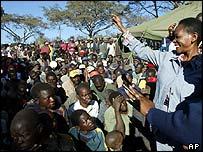The UN on the right side of an issue in Africa--for a change.

BBC NEWS- Africa has the story here. Understatement of the decade quote right here:
When I asked them if they were happy, I got a resounding no - so definitely there are challenges that we have to sort out
Anna Tibaijuka
UN envoy
Still, in fairness, the UN has clearly stepped up the pressure on Mugabe, who has claimed that the forced relocation and demolitions were for "removing criminals and reviving cities. Consider the following:
A UN envoy visiting Zimbabwe has said that the authorities could have taken steps to minimise the human impact of a controversial slum clearing programme.
Anna Tibaijuka told the BBC that while urban development was important, the government should have followed better procedures to avoid human misery.
Her visit follows international anger over the demolitions, which have left an estimated 275,000 people homeless.
Officials say the moves are aimed at removing criminals and reviving cities.
Ms Tibaijuka said she would submit her report to the UN secretary general, Kofi Annan.
Her visit coincides with Amnesty International reports that three more people have died during the clearances.
It's unfortunate that other African countries will not join the leaders of the G8 in condemning. Unfortunate, but not that surprising:
many of those other African governments have overseen similar brutal evictions in their own countries, and yet have suffered very little outside criticism.
The sad truth is that what is going on in Zimbabwe at the moment is not at all unusual.
From one end of Africa to the other, governments have set about slum clearance schemes without any consideration for the people who live there, or any sense of responsibility for what happens to them afterwards.
Unsanitary
Nigeria, the current chair of the African Union, was the scene of a huge mass eviction in 1990, when around 300,000 people were bulldozed out of the Maroko neighbourhood in Lagos in a single week to make way for corporate office buildings and executive villas.
Soldiers cleared the Washington area of Abidjan in Ivory Coast at gunpoint in 2002, turning people out of their homes, sometimes with less than an hour's notice.
Hundreds of families in Bonaberi area of Douala in Cameroon, lost their homes in similar purges.
These relocations are at best horrendous mismanagement and at worst depraved violations of people's property rights. With such a track record, is it any wonder that foreign investors are reluctant to support development in Africa. Granted, the US and Europe have played the subsidies game on agricultural products for far too long. This doesn't excuse the blatent corruption, power-jockeying and economic planning incompetance that has fueled the scandalous poverty that affects the continent. Increases in aid are not enought. Responsible governance must happen if any long-term changes are occur.
From the looks of Zimbabwe, such changes will not happen any time soon. The G8 nations must not allow this complacency to continue. They should lean hard on the African Union to condemn Mugabe's failed policies and even call on him to resign. Meanwhile, the rest of the world should do what it can to deprive this tyrant of his power to abuse his people to further his own political self-aggrandizement. Justice demands no less.





















<< Home